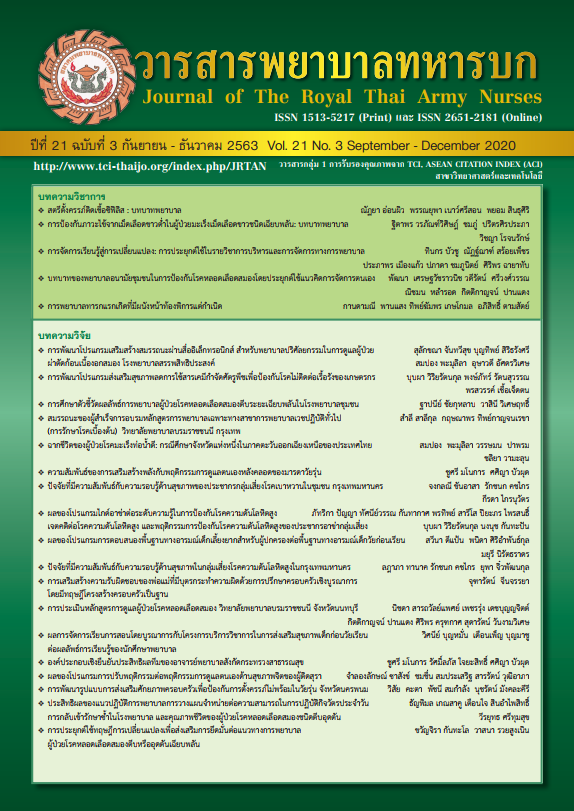The Effects of A Self - Management Program on The Functioning of Patients With Bipolar Disorder Undergoing The Recovery Stage
Keywords:
functioning, patients with bipolar disorder, self-managementAbstract
The purpose of this quasi-experimental research was to determine the effects of a self-management program on the functioning of patients with bipolar disorder during the recovery stage. The sample consisted of 72 patients with bipolar disorder aged between 20 and 59 years, recruited using inclusion criteria, and paired based on age. Then each pair was assigned to the control or the experimental group, with 36 patients in each group. The experimental group participated in the self-management program. Their activities comprised 6 sessions, each session lasting 100 minutes, once a week for 6 weeks. The control group received normal nursing care. The research instruments were the following: 1) the self-management program, which passed an examination for content validity by 3 professional experts; 2) the functioning assessment short test (FAST); and 3) the Young mania rating scale: Thai version. The reliability of these questionnaires were determined with a Cronbach’s alpha coefficient of .93 and .82 respectively. The data were analyzed using descriptive statistics and t-test.
The results found as follow: (1) The experimental group, participants had mean functional scores post test participating in the self - management program higher score than pre test (pre-test; M = 52.72, SD = 6.76 and post test; M = 64.31, SD = 6.09) the functional higher scores was significantly (t=16.83, p < .001). (2) The mean difference of the patients’ functioning between the pretest and posttest in the experimental group that participated in the self-management program (E = 11.58, SD = 4.13) was higher scores than the control group that received normal nursing care (C = 6.08, SD = 4.99) significantly (t = 16.37, p <.001).
Downloads
References
Lotrakul, M., and Sukanich, P. Psychiatry Ramathibodi. 4 th edition. Bangkok: Department of Psychiatry Faculty of Medicine, Ramathibodi Hospital. Mahidol University; 2015. (In Thai).
Sitdhiraksa, N., Wannasewak, K., Wannarit, K., Pukrittakayamee, P., Apinuntavech, S., Katumarn, P. Psychiatry Siriraj DSM-5. Bangkok: Prayoonsanthai; 2015. (In Thai).
Suratavamit, S., Soonthornchaiya, R. Selected factors related to functioning of patients with bipolar disorder. Thai Journal of Psychiatric Nursing and Mental Health. 2011; 25(1): 63-74. (In Thai).
Suksomnirundorn, N, Uthis, P. Factors related to quality of life of patients with bipolar disorders. Journal of Nursing Science Chulalongkorn University. 2012; 24(1): 68–82. (In Thai).
American Psychiatric Association. Diagnostic and statistical manual of mental disorder. 5th ed. Arlington, VA, American Psychiatric Association; 2013.
Seeherunwong, A, Yuttatri P, Kaesornsamut P, Thanoi W. Psychiatric nursing. Bangkok: Amarin Printing & Publishing; 2014. (In Thai).
Inoue, I., and Kimura, S. Prevalence and predictors of bipolar disorders in patients with a major depressive episode The Japanese epidemiological trial with latest measure of bipolar disorder (JET - LMBP). Journal of Affective Disorders. 2015; 174(15): 535-41.
eethongkham, S., and Uthis, P. The effect of negative symptoms self - management program on functioning of schizophrenic patients with negative symptoms. Journal of The Royal Thai Army Nurses. 2018; 19 (Supplement):459-67. (In Thai).
Leelanajan, T. Euthymia issues in medical practice. Bangkok: Beyond Enterprise; 2010. (In Thai).
Murray, G., Suto, M., Hole, R., Hale, S., Amari. E,, Michalak, EE. Self-management strategies used by ‘high functioning’individuals with bipolar disorder: from research to clinical practice. Clinical Psychology & Psychotherapy. 2011;18(2):95-109.
Srithanya Hospital. Introduction to psychiatric rehabilitation for health: employment for health personnel. Nonthaburi: Prosperous Plus; 2016. (In Thai).
Reinares, M., Sánchez-Moreno, J., Fountoulakis, KN. Psychosocial interventions in bipolar disorder: what, for whom, and when. Journal of affective disorders. 2014; 156: 46-55.
Seenee, A. Self management program in chronic diseases. Journal of The Royal Thai Army Nurses. 2014; 15(2):129-34. (In Thai).
Wongchan, W. Metabolic syndrome in adult : self - management. Journal of The Royal Thai Army Nurses. 2018; 19(Supplement):16-24. (In Thai).
Zarate, CA., Tohen, M., Land, M., Cavanagh, S. Functional impairment and cognition in bipolar disorder. Psychiatric Quarterly. 2000; 71(4):309-29.
Ryan, R., and Deci, E. Self - determination theory and the facilitation of intrinsic motivation, social development, and well - being. The American Psychologist. 2000; 55(1):68-78.
Suominen, K., Salminen, E., Latheenmaki, S., Tupala, T., Isometsa, E. Validity and reliability of the finish version of the functioning assessment short test (FAST) in bipolar disorder. International Journal of Bipolar Disorders. 2015; 3(1): 10.
Kongsakon, R., and Bhatanaprabhabhan, D. Validity and reliability of the Young Mania Rating Scale: Thai version. J Med Assoc Thai. 2005; 88(11):1598-604. (In Thai).
Downloads
Published
How to Cite
Issue
Section
License
บทความหรือข้อคิดเห็นใดใดที่ปรากฏในวารสารพยาบาลทหารบกเป็นวรรณกรรมของผู้เขียน ซึ่งบรรณาธิการหรือสมาคมพยาบาลทหารบก ไม่จำเป็นต้องเห็นด้วย
บทความที่ได้รับการตีพิมพ์เป็นลิขสิทธิ์ของวารสารพยาบาลทหารบก
The ideas and opinions expressed in the Journal of The Royal Thai Army Nurses are those of the authors and not necessarily those
of the editor or Royal Thai Army Nurses Association.






